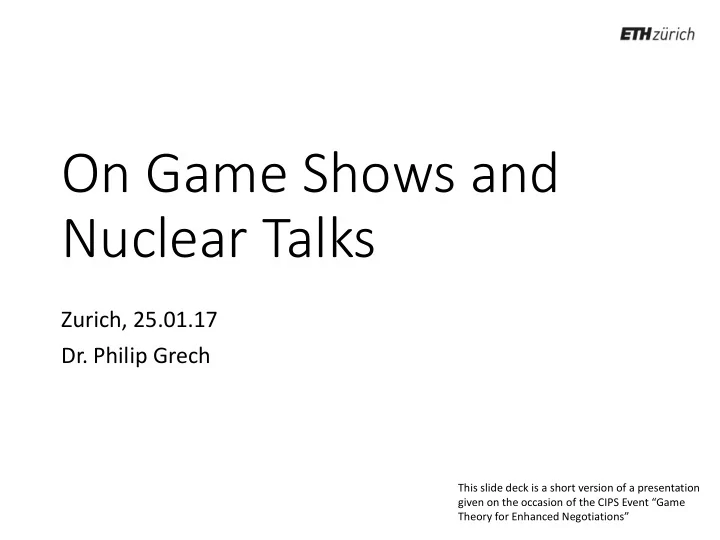

On Game Shows and Nuclear Talks Zurich, 25.01.17 Dr. Philip Grech This slide deck is a short version of a presentation given on the occasion of the CIPS Event “Game Theory for Enhanced Negotiations”
Chair of Negotiation and Conflict Management
What is Game Theory? Game theory is the mathematical theory of interactive decision-making: it models conflict and cooperation between rational decision-makers Applications in - Board Games - Business - Politics - Evolution - …
An Example No Not stable le: Abraham has an incentive to switch Nic ick Split Steal Split 500, 500 0, 1’000 Abraham Steal 1’000 , 0 0, 0 St Stable le: Neither Nick NASH nor Abraham have an Equilibria incentive to switch
What would you do? https://www.youtube.com/watch?v=S0qjK3TWZE8
Another Example Long-lasting deadlock P5+1 Iran Image: Dave Edmonds (CC BY-NC-SA) It is gratefully acknowledged that the following slides could be based on a slide deck by M. Ambühl and T. Langenegger
Iran Payoff USA Payoff Iran flexible inflexible flexible U S stable: A Nash inflexible No negotiation Both inflexible “lose -lose ” situation
No negotiation Photo: Office of the Presidency of f Iran Photo: White House Photo (CC BY) More centrifuges More sanctions (200 - > 20’000) (4 -> 80)
External factors changed the game Photo: White House Photo (CC BY) Photo: White House Photo (CC BY) Photo: Wikipedia/ José Cruz (CC BY) Photo: Wikipedia/ Mojtaba Salimi (CC BY-SA)
Iran Payoff USA Payoff Iran flexible inflexible stable Regional Power: Nash flexible Understanding U desirable S A Effect of sanctions inflexible Involvement of Concerns about Iran useful nuclear program Images: Wikimedia (CC BY)
Joint Comprehensive Plan of Action Vienna, 14 July 2015 Photo: U.S. Mission Geneva (CC BY-ND)
Thank you!
Recommend
More recommend